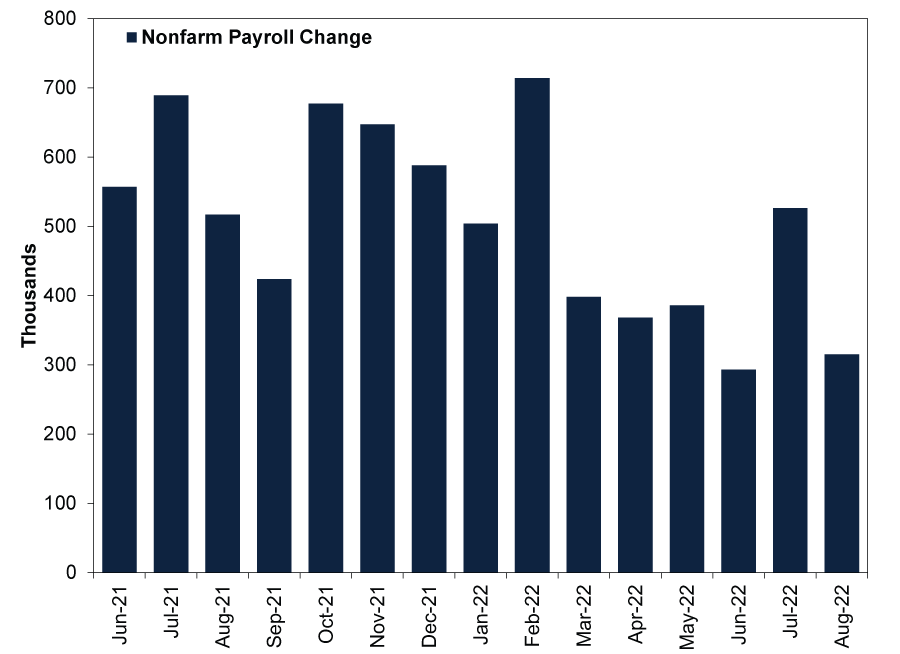Personal Wealth Management / Economics
American Jobs Data and the Pessimism of Disbelief
What to glean from the US’s good-jobs-news-is-bad-for-stocks mentality.
Coming into Friday’s widely watched US employment situation report, alarms abounded from commentators we follow. But, perhaps counterintuitively, their warnings weren’t that the data would support widespread recession (widespread economic contraction) narratives. No, most warned the opposite: that data would show a big payroll gain, suggesting labour markets remain tight—in turn, fostering more US Federal Reserve (Fed) hikes. There are myriad presumptions that underlie this good-data-are-bad-news theory, but above all, we think the inconsolable mood illustrates the Pessimism of Disbelief in action—a sign sentiment is too low relative to reality. Whilst American labour markets may mean little to British investors, the Pessimism of Disbelief is a key driver globally, in our view, and the jobs report provides a keen look at it.
Ahead of the release, we saw many headlines say signs of strong economic growth entail further Fed tightening. Commentators we follow argue those Fed hikes will pummel stocks even more. As the thinking goes, ongoing labour shortages and supply constraints mean any growth in payrolls is inflationary. To fight inflation, they say the Fed has to crush job growth and induce recession if need be to bring prices to heel. Under these conditions, commentators we follow argue the outlook for corporate earnings isn’t great. Hence, good news gets portrayed as really bad news.
Based on our observations, that was the general zeitgeist entering the release. Never mind that our research shows the link between jobs and inflation is tenuous at best. Never mind that rate hikes aren’t automatically negative for the economy or stock markets, in our experience, and that markets are very well aware the Fed is trying to tighten policy, which likely limits their surprise power. Never mind that we have found the Fed isn’t as powerful as commentators we follow suggest.
Regardless, we think Friday’s data should have eased those fears, as America’s unemployment rate rose (for positive reasons, in our view) whilst hiring cooled. August nonfarm payroll gains of 315,000 slightly beat expectations for 300,000 (although the US’s Bureau of Labor Statistics revised the previous two months down by 107,000, so eye-of-the-beholder and all that).[i] And, as Exhibit 1 shows, overall job growth has decelerated irregularly lately. The three-month average has noticeably slowed toward 300,000 from around 600,000 at the year’s start.
Exhibit 1: US Employment Growth Has Generally Slowed From Last Year
Source: US Federal Reserve Bank of St. Louis, as of 2/9/2022. US nonfarm payrolls, June 2021 – August 2022.
Meanwhile, the US unemployment rate edged up to 3.7% from 3.5%, as labour force participation (the share of working-age Americans who are either employed or seeking work) rose by a whopping 786,000—an increase not generally seen outside economic recovery from recession.[ii] It seems more people are being drawn into the pool of available workers, but prospective employers aren’t immediately hiring them. A greater labour supply, one would think, would theoretically assuage commentators’ tight labour market concerns somewhat, in our view, considering it suggests the labour market has more slack than expected.
Yet many commentators we follow turned immediately to how the Fed would react. Most of the chatter surrounded the likelihood of another “jumbo” rate hike at 21 September’s monetary policy meeting, supposedly to quell inflation, “regardless of the potential economic fallout.”[iii] Will it be a third-straight three-quarter point hike or just a half-point one? Presuming to know the collective mind of the Fed, one surmised “... policymakers at the Federal Reserve believe that the job market is effectively overheated: With twice as many open jobs as job seekers, employers are competing for workers by pushing up wages and, ultimately, prices. The Fed is hoping that by raising interest rates, it can cool off the job market enough to bring down inflation, but not by so much that unemployment skyrockets.”[iv] Still another cast the data negatively, arguing August’s tiny uptick in unemployment is evidence Fed hikes have already pushed the US economy into recession—with the outlook for stocks bleak—as headlines warn: “The summer rally is over.”[v]
We think all the Fed alarm smacks of the Pessimism of Disbelief, a regular phenomenon we see near bear market troughs (and the S&P 500 has endured a bear market, typically a prolonged decline worse than -20% with a fundamental cause, this year). Rather than take apparently good news as good, we find those under the influence of the Pessimism of Disbelief either dismiss it or argue it is fleeting and sure to morph into even worse negatives. But a focus on false negatives—like solid, but late-lagging employment data with little implication for forward-looking stocks—shows how low expectations are now, in our view. We think such downtrodden sentiment means relief and positive surprise—the forces our research shows power early bull markets (periods of broadly increasing stock prices)—is easier to attain. To us, it is one example showing the foundation of a market recovery is in place.
[i] Source: US Bureau of Labor Statistics and FactSet, as of 7/9/2022.
[ii] Ibid.
[iii] “Solid August Jobs Report Leaves Another Jumbo Fed Rate Hike on the Table in September,” Megan Henney, FOXBusiness, 3/9/2022.
[iv] “U.S. Job Growth Slows From Red-Hot Pace,” Ben Casselman, The New York Times, 2/9/2022. Accessed via the Internet Archive.
[v] “Recession Watch: Stock Market Rally ‘Is Over’ as Unemployment Starts Rising and Fears Intensify,” Jonathan Ponciano, Forbes, 3/9/2022.
Get a weekly roundup of our market insights.
Sign up for our weekly e-mail newsletter.

You Imagine Your Future. We Help You Get There.
Are you ready to start your journey to a better financial future?

Markets Are Always Changing—What Can You Do About It?
Get tips for enhancing your strategy, advice for buying and selling and see where we think the market is headed next.





